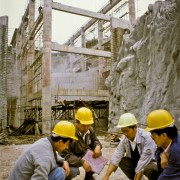Archive | April, 2012
Finance sector development
 Industry and trade
Industry and trade
 Social development and protection
Social development and protection
 Governance and public sector management
Governance and public sector management
 Industry and trade
Industry and trade

What makes an effective international financial safety net?

The global financial crisis showed the need for a large-scale and effective international financial safety net (IFSN). Although East Asia has had a regional financial arrangement (RFA) since 2000 (the Chiang Mai Initiative1), it was not tapped during the global financial crisis for a variety of reasons. Our recent study examines the requirements for an effective IFSN. It should have adequate resources to deal with multiple crises, be capable of making a rapid and flexible response, and not be encumbered by historical impediments such as the IMF stigma that would limit its acceptance by recipient countries. Oversight of the IFSN needs to be based on cooperation between global and regional forums, for example, in the case of Asia, the G20 and ASEAN+3.
Dealing with the “noodle bowl” of Asia’s free trade agreements

East Asia’s attitude toward free trade agreements (FTAs) has changed. Slow progress in global trade talks has led to a surge in FTAs across Asia. With the World Trade Organization (WTO) Doha Round trade talks stalled, Asian countries see FTAs as a way of liberalizing trade and investment and sustaining economic recovery. The number of signed and implemented FTAs in the region has increased from three in 2000 to more than 60 in 2012, sparking concerns about an Asian “noodle bowl” of agreements. Critics worry about overlapping rules of origin (ROOs) requirements, which may be costly to business, especially small and medium-sized enterprises (SMEs), and argue that this wave of agreements will undermine the multilateral liberalisation process. A search for pragmatic and innovative ways to untangle the noodle bowl of Asia’s free trade agreements is needed.
Is Japanese aid ineffective?

Since 2003, the Center for Global Development (CGD), a Washington-based think tank, has been ranking the aid programs of the world’s richest countries using its commitment to development index (CDI). The CGD produces an index of donor performance, which measures “aid quantity and quality”. This index tracks net aid transfer as a share of gross domestic product (GDP), while penalizing tied aid and project “proliferation” and rewarding aid to poor but non-corrupt recipients (this is referred to as aid “selectivity”).
Asia in the 21st century: the challenge of good governance

The concept of good governance has many aspects. I will focus on two here: corruption and the rule of law. All Asians aspire to live in a society in which they do not have to offer a bribe to anyone in order to obtain what they are entitled to under the law. They want to live in a society in which the policeman, prosecutor and judge are not corrupt. They want to live in a society in which licences and contracts are granted and policies are made in a transparent manner and based on merit and nothing else. Corruption is a cancer eating at the heart of Asia. It is one of the most shameful of Asia’s failings.
Moving the Trans-Pacific Partnership forward: what will it take?

The formation of a Free Trade Area of the Asia–Pacific (FTAAP) has been intensively discussed in recent years. However, it is anticipated that such an Asia-Pacific Economic Cooperation (APEC)-wide FTA would take many years to negotiate and involve numerous studies among all the APEC members, currently 21 in number. The Trans-Pacific Partnership (TPP) could be a viable alternative. It is intended to be a “high-quality, comprehensive 21st century FTA” that will promote economic integration in the Asia-Pacific region. In addition to deep commitments to tariff reductions, it aims to cover services trade, investment, intellectual property, government procurement, competition policy, labor, the environment, and many other issues affecting trade and investment.


Search
Subscribe / Connect to Asia Pathways
Subjects
- Agriculture and natural resources
- Blog
- Capacity development
- Climate change
- Economics
- Education
- Energy
- Environment
- Finance sector development
- Gender
- Governance and public sector management
- Health
- Industry and trade
- Information and Communications Technology
- Infrastructure
- Miscellaneous
- Population
- Poverty
- Private sector development
- Regional cooperation and integration
- Sanitation
- Social development and protection
- Transport
- Uncategorized
- Urban development
- Video Blog
- Water
Recent Posts
- Artificial intelligence: A new driver for inclusive growth and development?
- Increasing trust in cross-border e-commerce and artificial intelligence
- Enhancing access to maternal and newborn healthcare in developing Asia
- Can electric vehicles lead the way to a sustainable future?
- Mitigating climate-related sovereign risk to accelerate action on the climate emergency




Recent Comments